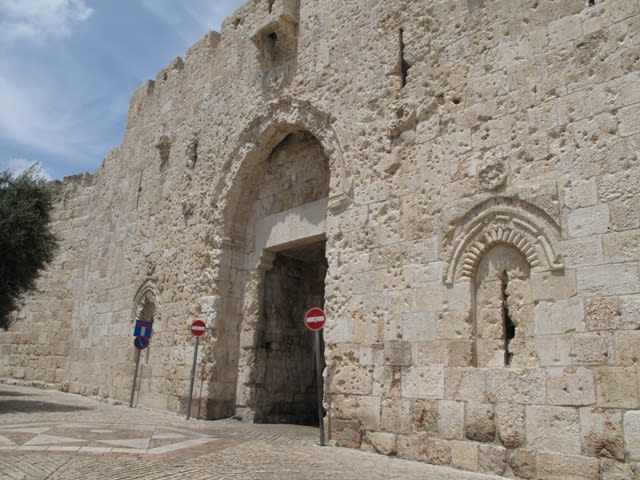Land of My Birth – The bloody War of Independence had ended (in Adar 5709, 1949), one month before the events to be described below. And for the first time, Pesach, the holiday of freedom, was to be celebrated in the State of Israel. After bitter battles and many who fell, Jerusalem had barely escaped capture and was even able to expand. But the Old City, including the Temple Mount, remained in Jordanian territory. As some minimal compensation for being separated from the Western Wall, the vestige of the Temple, Mount Zion served as a site expressing the yearning for the Temple. According to tradition, this is the burial site of King David. This was the only place from which it was possible – with great difficulty – to see any part of the Temple Mount.
In Nissan of that year, the entire area of Mount Zion was an advance army outpost overlooking the wall of the Old City, and it was out of bounds for civilians. Here is how one of the soldiers describes the situation:
“The cave of David’s burial site and its surroundings had remained as in the time of the Arabs. The place had the appearance of a mosque. The walls were covered with verses from the Koran and with Arabesque pictures. Everything still looked the same as when it was in Arab hands… Many of the people of Jerusalem, who had a tradition of reciting a description of the ritual of the Pesach sacrifice on Pesach eve at the Western Wall, begged to be allowed to go at least to Mount Zion. But they did not get permission, for reasons of security.”
There was one small consolation in the fact that the IDF unit which defended Mount Zion was given the privilege of holding a traditional Seder. With great effort, the company commander managed to obtain everything that was needed. The food was strictly kosher, as opposed to the previous year, when Jerusalem had been under siege and there was very little food, so that the people were allowed to eat “kitniyot,” legumes. But now those who were stringent were able to obtain absolutely kosher food… And “Matza Shemura” was brought to be used in the Seder. The soldiers sat at temporary tables, and an atmosphere of holiness surrounded the celebrants. The soldier quoted above continued his description as follows:
“Inspired by being in the burial place of David, King of Yisrael, perhaps for the very first time since the nation had been driven into exile from its land, in the ancient burial cave, now under control of the new State of Israel, the Jewish soldiers sat down to perform a Seder. By the light of candles, they sat deep in thought. Many thought about their families who were at the very same moment sitting in their own homes, and about this first time that they were away from home on Pesach. Many of the soldiers keenly felt that ‘while I am far away from my parents, I am at the same time very close to them.’ They were very proud to have the privilege of taking part in the Seder at this very holy place.”
Up to this time, Jews who wanted to visit David’s tomb had been required to beg the Arabs and suffer humiliation, paying an entrance fee to the “owners” of the site. But now the Seder was about to begin. A 16-year-old soldier, nicknamed “the youngest soldier in the country,” was given the task of asking the “Four Questions.” And indeed this year was very different from the previous one… After the Seder was over, the soldiers began to tell about their own experiences during the war and about the miracles that they had seen.
At the end of the Seder, the battalion commander gave a speech in honor of the occasion and in honor of the site:
“We fought very hard, and by the blood of our soldiers we were able to save the western section of Jerusalem. Now our eyes are turned towards the site of the Temple and the Old City of Jerusalem, where we will yet return.”
That is what the commander said in 1949. What can we say now, after we have been privileged to achieve what so many earlier generations failed to have, even though we do not have any greater credits than they did, and we have been in control of the Old City for forty years? We must give praise and thank G-d, and we must say: “How happy we are, how good is our lot, and how pleasant is our fate – and how beautiful is our heritage!”
(Source: Anonymous, “Moadim,” Pesach, edited by Avraham Shtal)
Reprinted with permission from Zomet Institute (www.zomet.org.il).
The words of this author reflect his/her own opinions and do not necessarily represent the official position of the Orthodox Union.
